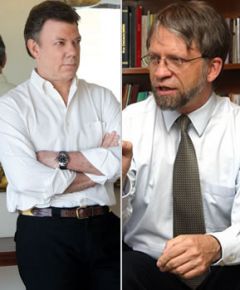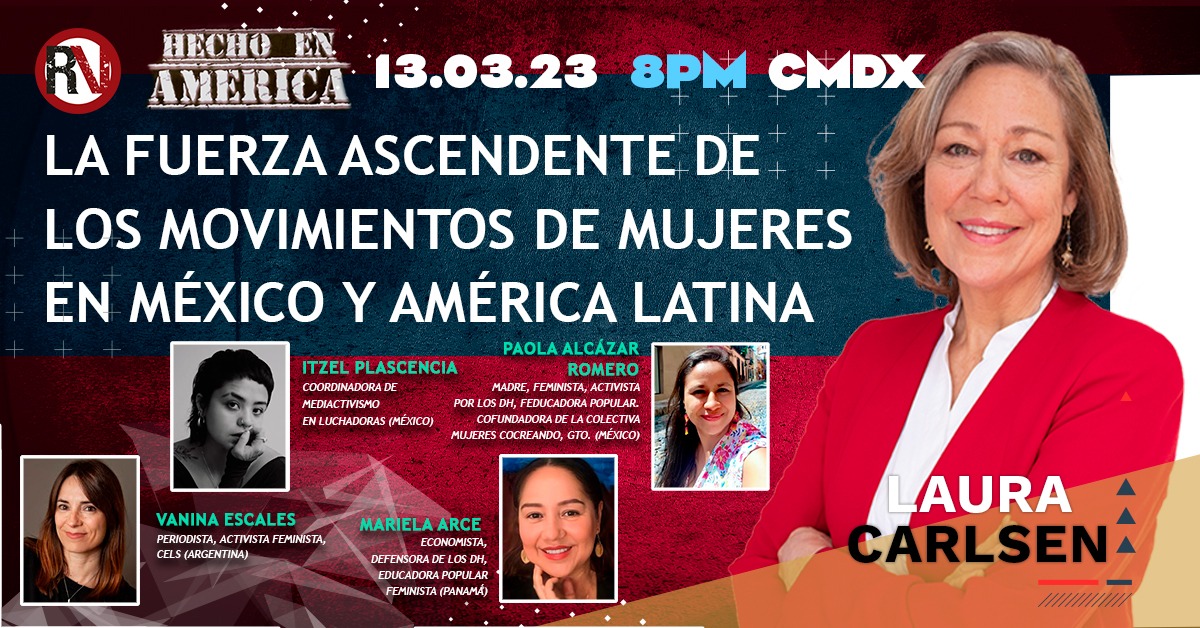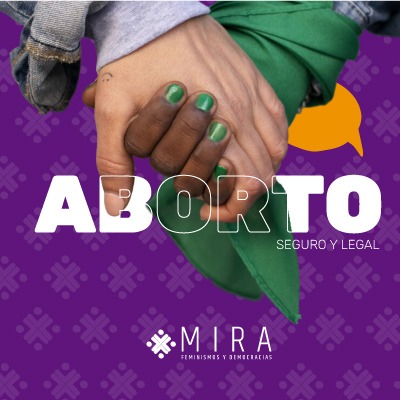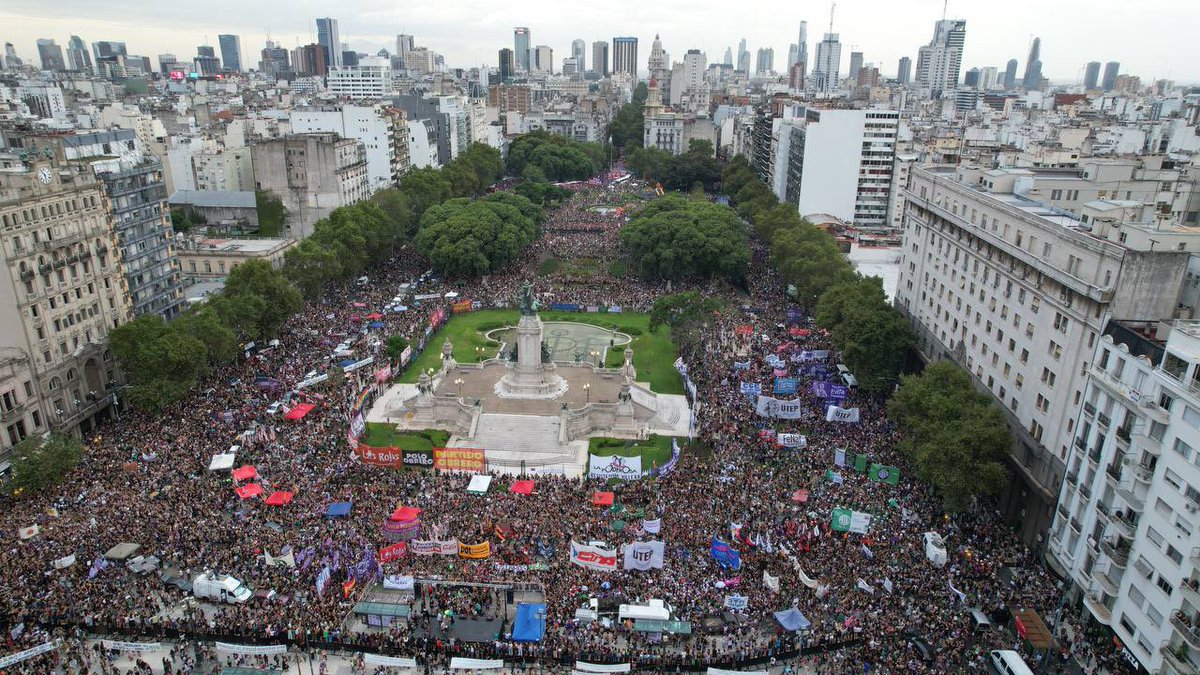
During the 8 years of the administration of President Alvaro Uribe, 5 million displaced persons have filled the poor slums of the country. Half the population still lives in poverty. Some 150,000 extrajudicial executions of innocent civilians have been registered throughout the country. It was revealed that 2,000 cadavers that the army presented as guerrillas were “false positives”—civilians assassinated in cold blood and disguised as combatants. A huge pit was discovered where the National Army had left 2,000 bodies five years ago. The Department of Security (DAS), the highest security office of the Colombian government, launched a witch-hunt against members of the political opposition, journalists and human rights defenders. Links between government officials and paramilitary groups were denounced that generated a huge scandal known as “parapoltiics”. Recently the president’s brother, Santiago Uribe, was accused of forming paramilitary groups.
These events in any other country would have led to a move to impeach a president. In Colombia they appear as isolated events that do not even affect the fascination of the majority of citizens with the Uribe administration and its supposed achievements in security. In light of the fact that they cannot re-elect Uribe to a third term following a Constitutional Court decision in Feb of this year, voters ended up giving the race in the first round of presidential elections on May 30 to his former minister of Defense and political heir: Juan Manuel Santos. Since he launched his campaign as the candidate of the National unity Party (better known as the party of the U, of which he is a founder), he has promised to move forward with the political program of the current government.
The result surprised anti-Uribe sectors that were hoping for a possible triumph of the Green party candidate—the mathematician and former mayor of Bogotá Antanas Mockus. Just two weeks before Election Day polls showed him as the likely winner.
But they failed to reflect the electoral reality. The predicted win of Mockus in the polls registered was the opinion vote, concentrated in the middle class and highly educated groups in four cities. O May 30 Santos not only beat Mockus, but he did it with double the votes. He received 46.56%, followed by 21.49% for Mockus. The runners-up were German Vargas Lleras of the Radical Change Party (also pro-Uribe) with 10.13%, and Gustavo Petro of the leftist Democratic Alternative Pole with 9.15%. The parties that dominated Colombian politics for 150 years before the arrival of Uribe in power came in last with 6.14% for the Conservative Party and 4.38% for the Liberal Party.
Not the enthusiasm of Mockus´s followers or the accusations of corruption and clientele practices surrounding the Santos campaign could overcome the gigantic electoral machine that supports the official candidate.
Dirty war in elections
Mockus is standing with his pants down, in a reference to one of his most famous symbolic actions during his years as Dean of the National University of Colombia. His back is to a group of drooling men made up of Venezuelan president Hugo Chavez, Ecuadoran president Rafael Correa and Cuban leader Fidel Castro. In the middle is the phrase: “Vote for Santos”.
It’s a billboard that appeared days before the first round vote in the city of Villavicencio.
In other regions flyers and other propaganda appeared that suggested that Mockus wanted to extradite President Uribe, that he would eliminate government social programs and that—even worse for an extremely religious population like Colombia—he was an atheist.
On several occasions Santos affirmed that these were isolated publicity moves that didn’t come from his campaign. But oddly the appearance of this wave of negative publicity coincided with the integration of an infamous figure in his campaign staff—the anti-Chavez Juan José Rendón. Along with Rendón several U.S. advisors joined the team with equally sinister pasts.
Rendón – who is also an old acquaintance of Santos and who is a key member of Uribe’s party – is known in the Latin American political sphere as “the king of black propaganda.” Colombia he became known in the 2006 elections when he advised the same party. His main achievement was create a smear campaign against then candidates for the presidency Rafael Pardo (of the Liberal Party) and Carlos Gaviria (Democratic Pole), who were accused of having links with the guerrillas of the Revolutionary Armed Forces of Colombia (FARC).
But it is not strange that El Tiempo allows the publication of these types of defamation. The newspaper has wide national circulation and is a sign of the imperial media owned by the Santos family, one of the oldest elites in the country. Juan Manuel Santos was editor of that publication in the 80s, and the majority of the current board are cousins and other relatives.
Meanwhile, in spite of the fact that diverse areas demanded that President Uribe must not intervene during electoral campaigns, he made the most of his public appearances to influence the public’s vote in favor of Santos. The most controversial of speeches the took place in Emisora Todelar de Nariño, where he asked his audience not to leave the “chicken” without their three nest eggs – security, investment and social policy. This is the fable created by the president that seems to have captivated a large share of the population.
Added to this wave of rumors and black propaganda are threats against the candidates Mockus and Petro during their respective campaigns.
The use of State programs as an electoral platform
Before and during Election Day, pro-Uribe allies in different regions put in place their traditional methods to secure victory: vote-buying, million-dollar contracts awarded to public works conglomerates to obtain electoral funding, false promises, and other corrupt political tricks.
Although these strategies were predictable, what is new – and shows the darkest side of favouritism – is gaining votes, using a platform of Uribe’s social programs, such as Families in Action. Such an initiative is supposedly charged with administering state subsidies for the nutrition and education of the children of poor families or families displaced by violence.
During their pre-electoral observation visit to Colombia in February this year, the International Pre-electoral Observation Mission, organized by the international organization Global Exchange, stated that, according to interviews with different sources, members of Uribe’s party and other hopefuls for the Senate and Chamber from Uribe’s wing had attended meetings with beneficiaries of the Program, days before the legislative elections. They were told that of they did not vote for the Uribe candidates, their subsidies would end. In addition, the organization observed the coincidence between the rise in the number of subsidies awarded by Families in Action and the rise in votes obtained between 2006 and 2010 by the political parties affiliated with the government of Álvaro Uribe Vélez.
As well as these denouncements are the reports broadcast by the news channel “Noticias Uno” in April of this year on the notification of benefits by this Program in the city of Bucaramanga (Santander) where people were called to attend meeting in support of Juan Manuel Santos. There they were forced to sign electoral registers under the threat of not receiving subsidies.
The extinction of alternatives
In the midst of these devastating surrounding, Antanas Mockus seemed to have lost his way in his campaign. His confusing and contradictory positions on key issues for the country like international relations, education, and health did not go down well in the televised debates with other candidates.
Many voters do not see in Mockus a real political option against Santos. His proposals coincide more and more with the Santos-Uribe discourse. On many occasions, for example, he reiterated his “no” to the humanitarian agreement, which many politicians opposed to Uribe policies see as the most feasible and humane way out so that FARC captives can be freed. He said that all doctors should only receive the minimum wage and he stated that he would respect the agreement so that U.S. soldiers could reside in seven military bases located in diverse corners of the country. He even said that he would ask for more North-American military aid.
But what buried any possibility of seducing the Left was the fact that he stated on various occasions that the Alternative Democratic Pole is a party that supports the armed struggle-an allegation not only unjustified, but also very insensitive in the context of the armed conflict in the country. Also, he has not taken a clear, strong position on reparations for victims of the armed conflict, especially State crimes, like the case of extrajudicial executions or false positives, or the persecution or trials of victims.
Additionally, his abstract discourse does not carry much weight in the regions, especially in rural regions and the public sector. “In the rural zones the people want candidates that solve their immediate necessities,” explained Camila Loboguerrero, editor of Votebien, a high-profile electoral news portal in Colombia.
“Mockus does not offer that and we could see that when we accompanied the candidate in Chocó. When he was in Quibdó, many people there wanted him to talk about the real needs of the people: the roads they don’t have, the sewers they don’t have, beyond a speech on political morality on how to change ethics from power, etc.”
“This discourse won’t wash…The Santos campaign, on the other hand, did mention the people’s needs, making its false promises. But regrettably this was welcomed by the public in a place where that type of politics is a custom.”
But Gustavo Petro, Democratic Pole candidate, the outcome was very encouraging. The media constantly underlined his good performance in the televised debates. His governing program was the only one to represent a clear break with the pro-Uribe agenda on relations with the U.S., NAFTA and free access to basic services and solutions to the kidnapping problem. In short, he presented solutions based on national sovereignty and social equality. However, the fact that he was part of the M-19 guerrilla group in the 80s, is something that many Colombians continue to see as his worst sin.
The Consolidation of the Right and the Political Suicide of Mockus
Although the electoral battle has not finished and there will be a second round in the elections on June 20, between Santos and Mockus, every indicator shows that Santos is guaranteed to win.
Added to the factors that enabled his triumph, mentioned above, are the alliances that he has managed to make with other right-wing parties. On June 9, Santos made his agreement with National Unity know, in a ten-point document that highlights aspects like “democratic prosperity”, “transparency”, “ zero corruption in private or in public”, and “good governance”. The document is basically a repeat of the fundamentals of the Uribe government with some meaningless modifications.
After officially releasing the document, the traditional parties (Liberal and Conservative) announced their support for the Santos campaign, in spite of the opposition of their own former presidential candidates. Santos also ended up with the support of former candidate Germán Vargas Lleras, and his party, Radical Change.
Since before the elections, the Pole had spoken of the possibility of an alliance with the Greens to confront pro-Uribe feeling. But Mockus insisted in rejecting alliances with any of the parties in contention, arguing the lack of political coherence that that would imply: “We are in a democratic transition process and we are scared that the record of the National Front will be repeated” (a reference to the agreement that ended the violence of the 50s, when Liberals and Conservatives shared power, ending the party-motivated killing but removing almost all power from the voters). He also said that in the Pole “there are still forces that have not broken links with those who justify armed conflict.”
In spite of the indignation generated by that statement, the Pole send an open letter to Mockus alter May 30 to propose five Basic points that the Greens Could adopt to get the official support of the Leftist party. The Pole was emphatic in stating that it did not seek posts. “We explicitly declare that we do not accept conversations or pacts about bureaucratic quotas,” announced the party’s president, Clara López, “nor will we participate in a Green Party government, given our deep differences regarding views of the social and economic model”.
The agreement’s points included aspects like overcoming narcotraffic cartel influence on the Colombian State: truth, justice and reparation for crimes against humanity: the end of keeping the opposition and social movements hostage; confiscation of land in narco hands so it can be given to peasants with few resources: defining a new international relations policy based on international sovereignty; and the construction of mechanism so that fundamental rights like health and education are free.
On June 4, Mockus—visibly fearful of losing possible Uribe-light votes—decided to reject any agreement with the Pole. He stated that although there was agreement on the need to defeat narco influence on the State and guarantees for the principles of truth, justice and reparation for crimes against humanity, there were differences with the Pole’s proposals on international relations and health and education.
The Pole immediately called on its supporters to abstain. “We consider it ethically impossible to call on citizens to support a candidate and a party that refuses to sign a public agreement on issues of paramount importance for Colombia’s progress,” said the PDA president, who also accused Mockus of opting for a “continuation of the current government”.
In the last week Mockus has said that his party will focus on capturing those who abstain and first-time voters. But many of those abstaining do not understand how one of the principles of Mockus is education in order to have peace, yet he rejects the possibility of it being free. And those who live in zones where access to polling stations is difficult are not going to make the mammoth effort required to vote a candidate who cannot convince them that he is even slightly different from his opposite number, as Loboguerrero states:
“In some regions it is difficult to vote. There is no guaranteed transport. There is much mistrust in the politics of this country and the electoral system. There is the belief that the corrupt win.”
The lack of ability to rally opposition forces adds to the strength of the Santos electoral machine with his recent electoral alliances and consolidation of Uribe sentiment in the collective imagination, making a win for Mockus unlikely, but not impossible, taking into account the results of the latest polls. As renowned independent Colombia journalist Antonio Morales explains to the Americas Program:
“You have to understand that a huge part of this country is permeated by drug trafficking, and agrees with it,” he says. “And the same people who vote for a person like Juan Manuel Santos have the same unethical beliefs as the Uribe State. You cannot believe that Colombians are a healthy people. The country is ill, Colombian society is ill and it doesn’t help when people vote against their own interests.”
Everything seems to indicate that Colombia Experts four more years of blood, impunity and corruption. Not even the “false positives”, illegal bugging of opposition by security forces, disappearances, the links of President Uribe’s cousin to drug trafficking, among other scandals, value more than the so-called achievements of the current government.
And so, a large part of the population are thankful to Uribe for having been named “the president with cojones” and feel obliged to guarantee the protection of their little nest eggs.
He is the security president – who undoubtedly confronted the insurgency with an iron fist. But he is also stained by the fact that his greatest hits signified the disappearance of millions of peasants, or were generated by false positives, or through the detention of social activists who were called “militants” in false testimonies.
He is the president who promoted investment, who brought foreign resources to the country that they never visited for fear of security problems. But the move did not exactly generate jobs (according to the latest data from the National Statistics Department, the unemployment rate rose to 12%), it only allowed multinational companies to get away with non-payment of taxes, while exploiting peasant, indigenous and Afro-colombian land as they pleased.
And finally, he is the social president, with some social programs like Families in Action that earned the loyalty of many poor Colombians, who will do anything for a subsidy. What was hidden was that the Pro-Uribe program personalized and privatized what was public, cutting the budget in every area (except military spending).
But President Uribe’s fans need not worry, as everything seems to indicate that those nest eggs will be looked after by the president’s heirs, those who will continue to hand out the countries resources as if they were pieces of bread. And the poor? They will get the crumbs.
Laura Del Castillo Matamoros is an independent Colombian journalist. During her career she has written reports and columns for independent media on armed conflict, social movements, political corruption and multinationals in Colombia. She now lives in Boston, Massachusetts.
For more information:
Colombia’s Elections: Under the Gun
https://www.americas.org/archives/2056
Colombia Elections 2010
https://www.americas.org/archives/2040
International Delegation Issues Preliminary Findings on Pre-electoral Conditions in Colombia
https://www.americas.org/archives/2034



